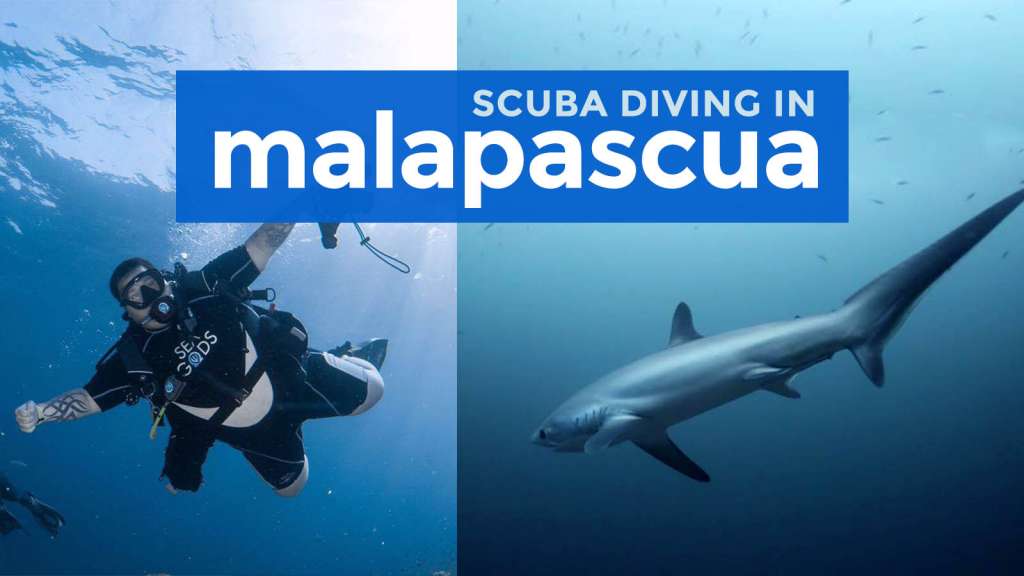As a scuba traveler exploring the world’s best dive locations, the Philippines has quickly become one of my favorites. There are so many world-class dive sites in Philippines, as well as a huge variety of rare species, making it one of the greatest scuba destinations in the world.
The types of diving in Philippines are also vastly diverse. From muck diving, wrecks, walls, drifts, pinnacles, macro, prestige reefs, sharks and much more, you could spend a lifetime exploring underwater here and never get bored.
One of those locations that I have continued to return to, and never get bored of, is Malapascua Island, in northern Cebu. Each and every time I visit Malapascua I manage to find something to surprise me.
Getting to Malapascua
In terms of remote dive locations, getting to Malapascua isn’t too difficult. After arriving by plane to Mactan in Cebu City, which is only an hour flight from Manila, I headed to North Bus Station.
From the north station it is only about 3 hours to the port, where the last bus stop is. From there it was a short wait at a boat dock, until the next boat was full enough to make the trip to Malapascua.
The boat trip is only about 15 minutes, and since most of the passengers were going to the same area, we bribed the boat crew to drop us off on the beach right in front of my hotel, rather than on the other side of the island.
Meet the Threshers
What Malapascua is famous for, and the reason most divers flock here, is to see the thresher sharks. They are one of the funniest and most unique sharks I’ve ever seen.
For my first two days, diving with the thresher sharks was my only priority. Each morning me and the other guests at the dive resort woke up at 4am, and headed to sea towards the sunrise to Monad Shoal.
Monad Shoal is an underwater cleaning station, where thresher sharks, and the occasional manta, come every morning to get a good cleaning from tiny cleaner fish. There isn’t much else to see here, but seeing those sharks is an amazing experience.
The sharks have a torpedo shaped body and huge eyes, giving them a lovely facial expression. But what makes them unique, and gives them their name, is the long upper part of their tail. It is so long that it amazes me every time I see it.
After a couple days of making life-long memories with the threshers, I started wanting to explore more of the dive sites around the island. I quickly found out that there is a whole lot more to diving Malapascua than just threshers.
Beyond Thresher Sharks
The first stop was Gato Island, a 45 minute boat ride from the resort. There is good diving all around Gato, and the crew will decide what spot you will dive that day based on the currents when you arrive.
One one dive there was a long cave that we swam through, filled with pufferfish, batfish, file clams and more. There was even a little nurse shark inside, sleeping in the sand.
Outside the cave is the sloping wall, coming down from the sheer island cliffs into the water. The healthiness of the reef, and the abundance of so many incredible species there is incredible.
For two days I dove Gato Island, 3 dives per day, seeing something new and interesting every time. From bright orange frogfish to spanish dancers to nudibranchs and ornate ghost pipe fish and many many more.
Even the soft corals were incredible, with neon colors that made them look like something out of a Mario Brothers Nintendo game.
If I wasn’t watching banded sea snakes on their hunts, I was running into cuttlefish or dodging turtles. If i wasn’t taking photos of tiny shrimp, I was avoiding dozens of angry clownfish.
On my last night in Malapascua, I heard about another unique dive, where you can see spawning mandarinfish. I had never seen a mandarinfish, but it had always been on my critter bucket list. So we headed out.
The dive site with the mandarins is only about 5 minutes from my resort, and since you can only witness them spawning at dusk, we got to see an amazing sunset during that short ride, as the sun sank down over the water.
The dive site itself is just a pile of white, broken pieces of reef and rocks, which make the perfect home for mandarines. We were told to make a circle around the pile, and just sit and wait, and keep an eye out.
Pretty soon I saw my first tiny, colorful mandarin, then another. After a while I had saw lot of them, and they were starting to chance each other around and get more active. It was amazing, Id never even seen one, now I had seen 20!
Eventually it happened. two mandarins would come together, sniffing each other nose to nose, swimming in a tight circle. Then, chest to chest, they come together, start to slowly ascend, then shoot toward the surface together very fast.
As they shoot upward, the male releases his sperm, and the female her eggs, mixing them together in the frenzy. From there they part and go their separate ways, leaving only a tiny cloud in their wake.
Once we were out of air, and back to the boat, I got to reflect on what I had seen. These experiences on just this one single trip to Malapascua had turned into unique, and I am sure, long-lasting memories.
2️⃣0️⃣1️⃣8️⃣ • 1️⃣ • 2️⃣4️⃣
